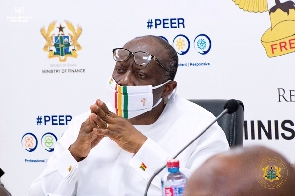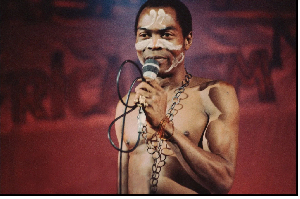INTRODUCTION
Majority of Ghanaians eat and drink politics. Everything is seen through the spectacle or the magnifying glasses of politics, especially the NPP versus the NDC dramas, when Ghanaians could be doing themselves a huge favor by seeing politics through the lens of Ghanaians first.
There is fallout within the NDC over the recent re-approval and re-appointment of Hon. Ken Ofori-Atta, a co-founder of Databank Group, as the Finance Minister of Ghana. This has led to the resignation of Hon. Okudzeto Ablakwa, the MP for North Tongu and Member of the Appointments Committee of the 8th Parliament of the Fourth Republic of Ghana.
Some people have read meanings into reasons for his resignation, positing it as his personal protest for the re-approval of Hon. Ofori-Atta because his MFund Investment Company has grown in leaps and bounds out of “corrupt practices” and his family connections to the President, in spite of the fact that Hon. Ablakwa has explicitly stated his reasons as “personal and on principle.”
This piece is intended to shed a little light on the nature of Mutual Funds, a line of business of Databank’s MFund Investments. Hopefully, this may enhance proper knowledge regarding the financial success of Databank Investments; lack of which knowledge too often lead some people to easily succumb to political propaganda of malfeasance.
WHAT IS A MUTUAL FUND?
A Mutual Fund, as the name suggests, is a type of financial vehicle or an investment alternative made up of a pool of money collected from many people who have surplus amount of money and want to grow it (called investors), using licensed professional money managers who understand the workings of the securities markets or investment market.
Mutual funds are more appealing to investors because most mutual are affordable in the sense that individual investors can start with less amount of money, as compared with other investment alternatives. They are also good choices for individuals with limited investment knowledge.
With Mutual Funds, investors can open Mutual Fund accounts and comfortably expect experts to deliver good outcomes. Thus, Mutual Funds give small or individual investors access to professionally managed portfolios such as equities, bonds, Treasury bills, and other securities.
Each individual investor is a shareholder and therefore, participates proportionally in the gains or losses of the Fund. Mutual Funds invest in a vast number of securities, and performance is usually tracked as the change in the total market capitalization of the fund, achieved or derived by the aggregating performance of the underlying investments.
Mutual Fund managers may decide to invest in the Money Markets or markets designed for the making of short-term loans (i.e., money managers lend out the pool of investors’ money for a period not more than one year to purchase a financial instrument, such as a 90 or 180-day Treasury bill in return for interest income).
They may also decide to invest in the Capital Markets or markets designed for the making of long-term loans (i.e., money managers lend out the pool of investors’ money for a period more than one year to purchase a financial instrument, such as a stock or bond). (Hayes, 2020, “Mutual Fund.”)
A bond is usually a long-term debt instrument, usually issued by governmental entities or large business companies to investors for specified amount of money in return for payment of principal and interest at a specified time frame that is usually more than one year.
Because dealings in financial instruments can become quite complicated for those with limited knowledge in investments, people who have the surplus amount of money who want to grow such money (called investors) usually engage the professional services of people who understand the nuances of money management or investment bankers to perform those functions on their behalf. For example, 5 people or investors who have GH¢50 each as surplus money to grow or invest for profit may engage the services of hypothetical Cash Funds or CFunds investment managers.
CFunds professional managers may decide to lend the money out, totaling GH¢250 to XYZ Corporation, a manufacturer of soap and detergents, who may need the GH¢250 to upgrade its machines or purchase new ones to manufacture its soap and stay competitive. In return, XYZ Corporation is legally obligated to pay CFunds 10% interest for a stipulated time period of say 6 months or 180 days.
On that stipulated time and date, XYZ Corporation is obligated to pay CFunds an amount of GH¢25 in interest plus the GH¢ 250 principal borrowed, making GH¢275.
Let’s assume, the investors in turn agreed previously with the CFunds managers for 8% on their total investment of GH¢ 250, it will mean GH¢20 (i.e., 0.08 x GH¢250). Sharing this GH¢20 equally among the 5 investors yields GH¢4 each (i.e., GH¢20 / 5 = 4).
Thus each investor gets GH¢54 from her initial investment of GH¢50. The remaining GH¢5 out of the GH¢275 received from XYZ Corporation becomes the revenue for CFund and after deducting their costs, a profit may be realized for CFunds. This is a simplified illustration of how Mutual Funds make their money or produce capital gains or income for the Fund's investors and themselves.
THE RISE OF THE MUTUAL FUNDS AND THEIR OBJECTIVES IN GHANA
There are over 30 licensed Mutual Fund schemes in Ghana, some old and much experienced and others young and not so much experienced, with each having their own investment goals. For instance, there are those that invest pooled funds in short-term securities with lesser risk but smaller returns, and those that invest in long-term securities with higher risk but higher returns.
The various goals inform their diversification of assets. It’s all driven by investor preference and managerial philosophy. The growing interest in mutual funds of late has led to a rise in various fund schemes in the country.
An Investor needs to consider certain key factors before selecting from the numerous available funds for investing. These key factors include, but not constrained to, fees and commissions charged by those MFs, the track record, experience, and managerial antecedence of the fund managers (Sikasem, 2017, “Performance comparison.”)
COMPARISON OF THE ANNUAL RETURNS OF FOUR MUTUAL FUNDS FROM THE PERIOD 2012 – 2016 AND THEIR 5-YEAR AVERAGE
Table 1 compares the annual returns in percentages of four Mutual Funds, including Databank Mfund of Ken Ofori-Atta. This was during the period, 2012 to 2016, when Mr. Ofori-Atta was not a Finance Minister yet and could not have been in any position to influence the performance of Databank Mfund.
The reason why the performance of Databank Mfund is of particular interest to this study is to have some measure of the Fund’s own performance, outside of any political influence. This rationale also informed the choice of data points or period prior to Ofori-Atta becoming a Finance Minister.

ANALYSIS OF TABLE 1
Money Market Funds in Ghana benchmark their returns against the average Bank of Ghana Treasury bill rate for the year, usually the 91-day term. What we can learn from Table 1 is that FirstBanc Firstfund did very well for the five-year average of 35.76% against the average Treasury bill benchmark of 21.92%.
This was followed by EDC Fixed Income Unit Trust with 22.18%, followed very closely by Databank with 22.03%, then by HFC Unit Trust with 21.84%. So it can be seen that Databank Mfund exceeded the benchmark over the 5-year average by 0.11, as well as outperforming the benchmark in three of the five years.
OBJECTIVES OF A MUTUAL FUND
Typically, a Mutual Fund aims to increase income, either through aggressive stock investments or through more conservative Treasury bills investments.
Sometimes, the term Money Market is used in combination with Funds. They are both pools of investor money invested by professional money managers. Money Market Funds focus only on low-risk and short-term debts such as Treasury bills, and values more the safety of principal over the chance of high profits.
Thus reflecting the name Money Market is a good way for signaling to potential conservative and risk averse investors, that the Fund focuses only on short-term loans with lesser risks, to distinguish it from a capital market or long-term loans with higher risk.
A Money Market Fund is a type of Mutual Fund that invests in cash and low-risk, short-term debt securities. Money market funds are considered one of the least risky investment vehicles available, given the shorter time frame in which repayment of principal plus interest may be due.
It generates income, usually at par with short-term interest rates, which may be either taxable or non-taxable, depending on the investments held by the Fund.
Money market funds are highly liquid (i.e., easily convertible to cash), and they are generally used by investors to manage cash or short-term savings (Ashford, 2020, “What Is A Money Market Fund?”)
Mutual Funds that have the objective of growing the investment more aggressively, primarily invests in common stock and sometimes preferred stock, and are commonly called Equity Funds.
CONCLUSION
The investment world is always underpinned by the word ‘confidence,’ probably more than capital or its absence. Ken Ofori-Atta’s Databank, having been in existence since April 1990, has had ample time to gather both industry experience and build a wider alumni base of professional money managers.
The Mfund alone has been exhibiting steady growth since 2004, with a GH¢100 investment growing steadily from this period into GH¢1,689.50 in the first quarter of 2021 (Databank MFund Fund Fact Sheet, 2021).
Thus, when he was asked the question of why close associates of his at Databank have been given public office in finance and insurance by Hon. Okudzeto Ablakwa on issues bordering on ‘state capture,’ he was accurately responding to facts regarding the issue of competence and deep knowledge of Databank alumni and their problem-solving skills, especially, in the financial sector (Ghanaweb, 2021, “Ken Ofori-Atta explains why Databank.”)
The general perception that had been created out there, howbeit wrong, as finance minister and cousin of the President, was the probability of benefiting in some way from his unique position and connection to help his Databank. There was a perceived “mismanagement and corruption on the part of the Executive” and Ofori-Atta must, in some way, be connected and a beneficiary of such perceived “mismanagement and corruption.”
Having been a Finance Minister since 2017, and being personally close to the President, it must be expected that, that alone will be enough to boost investors’ confidence in his Databank, which in turn, could impact the company’s fortunes and, of course, his too.
But what many couldn’t grasp in-depth was the huge amount of fortune that could be made in the world of professional investment. Having a scanty knowledge of this world of investment finance, it became rather quite politically enticing and convenient to attribute Ofori-Atta’s wealth to ‘connections’ to people in high places, at the expense of Ghana.
Thus, as Prof. Ransford Gyampo rightfully observed, when the opportunity finally presented itself to cross-examine in hopes of denying his re-approval as finance minister for all his perceived “greediness, corruption, incompetence, and insensitivity,” (GhanaWeb, 2021, “We aren’t always that gullible”), the opposition NDC leadership failed woefully to find any evidence against Ofori-Atta and were, therefore, confronted with a forced situation to re-approve Ofori-Atta’s nomination en masse. Naturally, the NDC grassroots could not understand why their leadership would re-approve Ofori-Atta after all the allegations that they had ‘heard from them about him.’
The Deputy Minority Whip in Parliament and MP for Banda Hon. Ahmed Ibrahim has asked members of the NDC not to attack members for re-approving the nomination of Ken Ofori-Atta as Finance Minister. His reason for the re-approval was, “If you change him [Ofori-Atta] and bring [in] a new person [Finance Minister], the kind of excuses he [i.e., new person] will be giving will be ‘you know I was not responsible for that’. So if he says that he [Ofori-Atta] is the best man for the economy, then let Ken Ofori-Atta be the minister and we will see the kind of growth figures that he will churn out” (JoyOnline, 2021, “Don’t begrudge NDC leadership.”)
This explanation appears to be quite lame. This is for the simple reason that no rational and patriotic individual, particularly in a responsible position as an MP, will want to stay careless to any unhealthy situation that is injurious to the interest of his country to get worst for four more years, for the sake of harvesting selfish political interest.
The only rationale for Ofori-Atta’s re-approval en masse by the NDC leadership was because the allegations of “corruption and incompetence” had fallen flat on the faces of the accusers and was most unsupported. The NDC leadership played politics as usual and it backfired, as they had no way of substantiating their perceived allegations.
In a press release signed by its General Secretary Mr. Johnson Asiedu Nketia, the party assured its members that the leadership re-approved Ofori Atta in consideration of the “exigencies of the situation,” and urged the rank and file of the party to remain calm and “circumspect” in their reactions on the re-approval and re-appointment.
Given that Mfund’s performance was good even before Hon. Ofori-Atta became Finance Minister; it stands to reason that the Fund’s owners, including Hon. Ofori-Atta, must have been personally financially independent. Therefore, opposition’s allegations or perception of “greediness, corruption, incompetence, and insensitivity” (Ghanaweb, 2021, “We aren’t always that gullible.”) cannot hold true.
Also, Hon. Ofori-Atta’s claims that he does not take “salary or per diem” for his role as Finance Minister (Nyabor, 2021, “I don’t take salary or per diem”), must necessarily hold true for the simple reason that he had a satisfactory source of income, a self-accomplished entrepreneur, who had no need for additional income for serving the public.
And the fact is those kinds of people do exist. They are called philanthropists. This writer, who once had access as a worker to employees’ salary scale that was freely and legally made available on the City of New York government agencies computers, is a witness to the US$1 token annual salary of billionaire former New York City Mayor Michael Bloomberg.
He was supposed to be earning US$300,000 per year, but Bloomberg refused all those salary. This was about the time the basic salary of the President of the United States was US$200,000 annually before the increment to US$400,000 annually, which started with former President George W. Bush.
Whilst we are at this subject, it might interest you to learn about those US presidents who refused to take a salary. The US Constitution requires a president to take a salary.
The framers of the Constitution wanted a financial protection for even wealthy presidents from misfortune that could tempt them to take bribes or turn into corruption. The salary may have also been designed to ensure that a lack of personal wealth would not prohibit a president-elect from taking office.
Four presidents refused a salary. Instead, they donated all or part of it.
Donald J. Trump donated his $400,000 annual salary to various federal departments from 2017 to 2020. As of October 15, 2020, Trump's net worth was $2.5 billion.
John F. Kennedy donated his $100,000 salary to charity. He was the beneficiary of a multimillion-dollar trust fund. He also donated his salary while serving 14 years in Congress.
Herbert Hoover divided his salary between various charities. He gave some of it to his staff. Hoover's net worth was around $4 million in 1913, worth about $105 million today.
George Washington donated his $25,000 salary. He used some of it for travel expenses. He needed a special chariot to take him through the rugged roads of the South. He had also foregone a salary while he was the US’s military commander (Amadeo, 2020, “Presidents' Salaries.”)
REFERENCES
Amadeo, K. (2020). “Presidents' Salaries During and After Office.” Retrieved on April 2, 2021, from, https://www.thebalance.com/presidents-salary-4579867
Ashford, K. (2020). “What Is A Money Market Fund?” Retrieved on April 2, 2021, from, www.forbes.com/advisor/investing/what-is-money-market-fund/
Databank MFund Fund Fact Sheet. (2021). Retrieved April 3, 2021, from, https://www.databankgroup.com/fund-fact-sheet-february-2021/
Ghanaweb. (2021).
“Ken Ofori-Atta explains why Databank directors are holding positions in the banking sector.” Retrieved April 2, 2021, from, www.ghanaweb.com/GhanaHomePage/NewsArchive/Ken-Ofori-Atta-explains-why-Databank-directors-are-holding-positions-in-the-banking-sector-1215598 GhanaWeb. (2021).
“We aren’t always that gullible – Professor Gyampo slams NDC MPs over Ofori-Atta’s approval.” Retrieved on April 2, 2021, from, www.ghanaweb.com/GhanaHomePage/NewsArchive/We-aren-t-always-that-gullible-Professor-Gyampo-slams-NDC-MPs-over-Ofori-Atta-s-approval-1220197
Hayes, A. (2020). “Mutual Fund.” Retrieved April 2, 2021, from, www.investopedia.com/terms/m/mutualfund.asp
JoyOnline. (2021). “Don’t begrudge NDC leadership for approving Ofori-Atta as Finance Minister – Deputy Minority Whip to NDC members”) Retrieved April 2, 2021, from, www.myjoyonline.com/dont-begrudge-ndc-leadership-for-approving-ofori-atta-as-finance-minister-deputy-minority-whip-to-ndc-members/
Nyabor, J. (2021). “ ‘I don’t take salary or per diem’ – Ken Ofori-Atta.” Retrieved on April 2, 2021, from, ‘I don’t take salary or per diem’ – Ken Ofori-Atta
Opinions of Sunday, 4 April 2021
Columnist: Charles Addo, PhD















